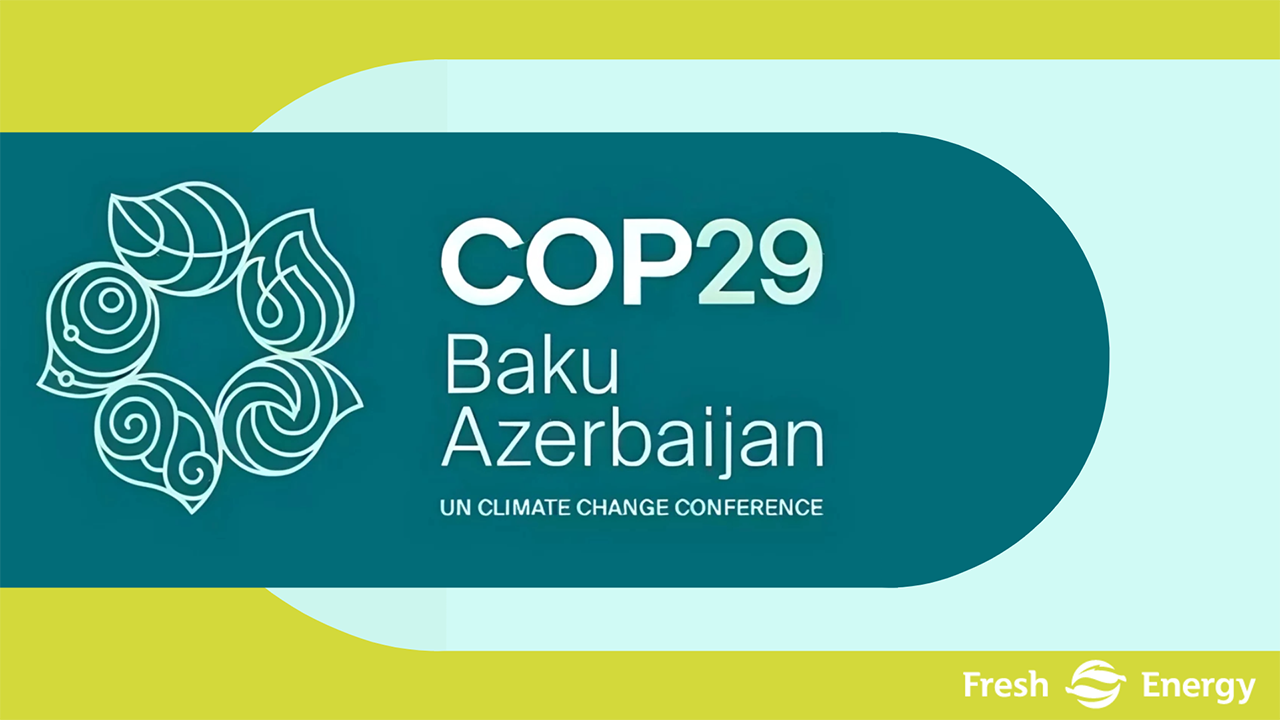
This year will be is J.’s ninth year at the U.N. Climate Change Conference! Stay tuned to this page for updates ahead of COP29 and daily during the conference in Baku, Azerbaijan from November 11 through November 22.
December 3 | Webinar: COP29 and Fresh Energy: Discussions with J. Drake Hamilton
Sunday, November 24 | COP29 draws to a close
In the early hours this morning negotiators at the United Nations climate summit reached a successful agreement, and they have now concluded the conference.
Almost 200 countries agreed to triple the flow of money to help developing countries adopt cleaner energy and mitigate the impacts of climate change. Wealthy nations pledged to reach $300 billion per year in support by 2035. That’s up from the current target of $100 billion per year.
Independent climate economic organizations have put the needs of developing countries considerably higher, at $1.3 trillion per year. That is the amount experts say must be invested in the energy transition of lower-income countries — in addition to what those countries already spend — to keep the planet’s average temperature rise below 1.5 degrees C.
COP29 featured two weeks of divisive debate over who should pay and how much should be paid for climate finance. Delegates from several countries in the early hours of November 24 immediately assailed the amount of climate funding as inadequate, falling “far short of the trillion-plus figures that the poorer countries sought at COP.”
India called $300 billion “a paltry sum.” Panama’s special envoy for climate called out that, “[t]his process was chaotic, poorly managed, and a complete failure in terms of delivering the ambition required.” Several delegations said it no longer makes sense that China and Saudi Arabia are not considered developed nations, and that they should instead be designated developed and be responsible for contributing large sums of climate finance.
The deal calls on private companies and international leaders like the World Bank to cover the hundreds of billions of dollars in the shortfall. The former U.S. special envoy to President Biden on climate change, John Kerry, said publicly several dozens of times at four previous COPs that large sums of private finance are needed to finance climate action of all types in developing countries.
Azerbaijani officials leading the conference haven’t done enough to push forward an ambitious deal that would build upon the 2023 UAE consensus, in which 198 countries finally agreed to “transition away” from fossil fuels and accelerate decarbonization within the next 10 years.
Next up for the Parties to the U.N. Framework Convention on Climate Change: each must develop a climate plan “3.0” that will allow their nation to meet the UAE consensus (tripling renewable energy capacity and doubling energy efficiency by 2030, along with many other specific targets).
These climate plans are due to the United Nations by February 10, 2025, and they will be visible to the world. They must also detail how their nation will disclose transparently how their emissions can be tracked by other nations. There is much more that can and must be done.
Please register to join my COP29 webinar on Tuesday, December 3, from 11 a.m. to 12 p.m. for my reflections from the United Nations Climate Summit. We’ll hold time for you to pose questions and get them answered. In the meantime, have a wonderful Thanksgiving!
Thursday, November 21 | COP29 deadline approaches for global climate deal
David Turk, Deputy Secretary of Energy, told a large public audience on November 20 at the U.S. Center pavilion, “Effective in January, the United States government will be defecting from any position of responsibility. But that doesn’t mean that there isn’t going to be considerable activity coming out of the U.S.”
Nonetheless, the COP29 negotiations seem stuck because of several intersecting streams of discord.
Argentina’s negotiating delegates took part in the first two days at COP29. Argentina ordered their delegates to withdraw from COP29 and return home on November 13; the delegates were not authorized by their government to speak on record. Last week, Argentine President Milei was heading to Mar-a-Lago to meet with Donald Trump. Milei has said at the United Nations that climate change is “a fraud.”
A headline in a New York Times report on November 19 read: “Saudi Arabia is a ‘Wrecking Ball’ at global climate talks.”
The article continues: “Despite endorsing a transition away from fossil fuels [at COP28 in Dubai], Saudi officials have since worked to undermine it in at least five U.N. forums, diplomats said. … diplomats from Saudi Arabia, the world’s top oil exporter, are working to foil any agreement that renews a pledge to transition away from fossil fuels.”
U.N. rules require that any negotiating text developed at a climate summit must be endorsed by all 198 participating nations. Of Saudi Arabia’s virulent agenda, Alden Meyer, senior associate with E3G, a climate research organization, said in The New York Times, “Maybe they’ve been emboldened by Trum’s victory, but they are acting with abandon here … They’re just being a wrecking ball.”
At COP29, the sense of anxiety has cast a pall over the U.N. conference since Trump won the U.S. Presidential election. Trump has vowed to pull the U.S., again, out of the Paris Agreement. The Samoan chair of more than 40 small island states (AOSIS) said this week of the Argentina withdrawal and of Saudi Arabia’s year-long effort to stymie global action: “This is a global issue, and it requires a global response.”
When the conference closes at midnight in Baku on Friday, November 22, negotiators must leave Azerbaijan with a strong agreement on international climate finance. Economists agree that by 2030, developing nations will need roughly $1 trillion a year. The money is needed to enhance the globe’s ambitions and will lead to greater and faster emissions reductions. 198 countries need to agree in COP on which nations will contribute; the climate finance also must be of high-quality, more grants than loans to poorer countries.
November 21 | My radio interview with KMSU
Tune in and listen to my half-hour radio interview about COP29 with KMSU. I shared my insights about COP29, as well as my experience attending past global climate summits, with KMSU’s Karen Wright for their “Every Day Is Earth Day” segment.
I greatly enjoyed my talk with Karen while in Azerbaijan, and this is an especially helpful interview before my upcoming COP29 webinar on December 3, which you can still register for.
November 19 | My neighborhood in Baku
Some people have asked me about “my” temporary neighborhood in Baku, Azerbaijan. I’m in a 7-story hotel in a neighborhood of mostly residences and small businesses (markets, primarily).
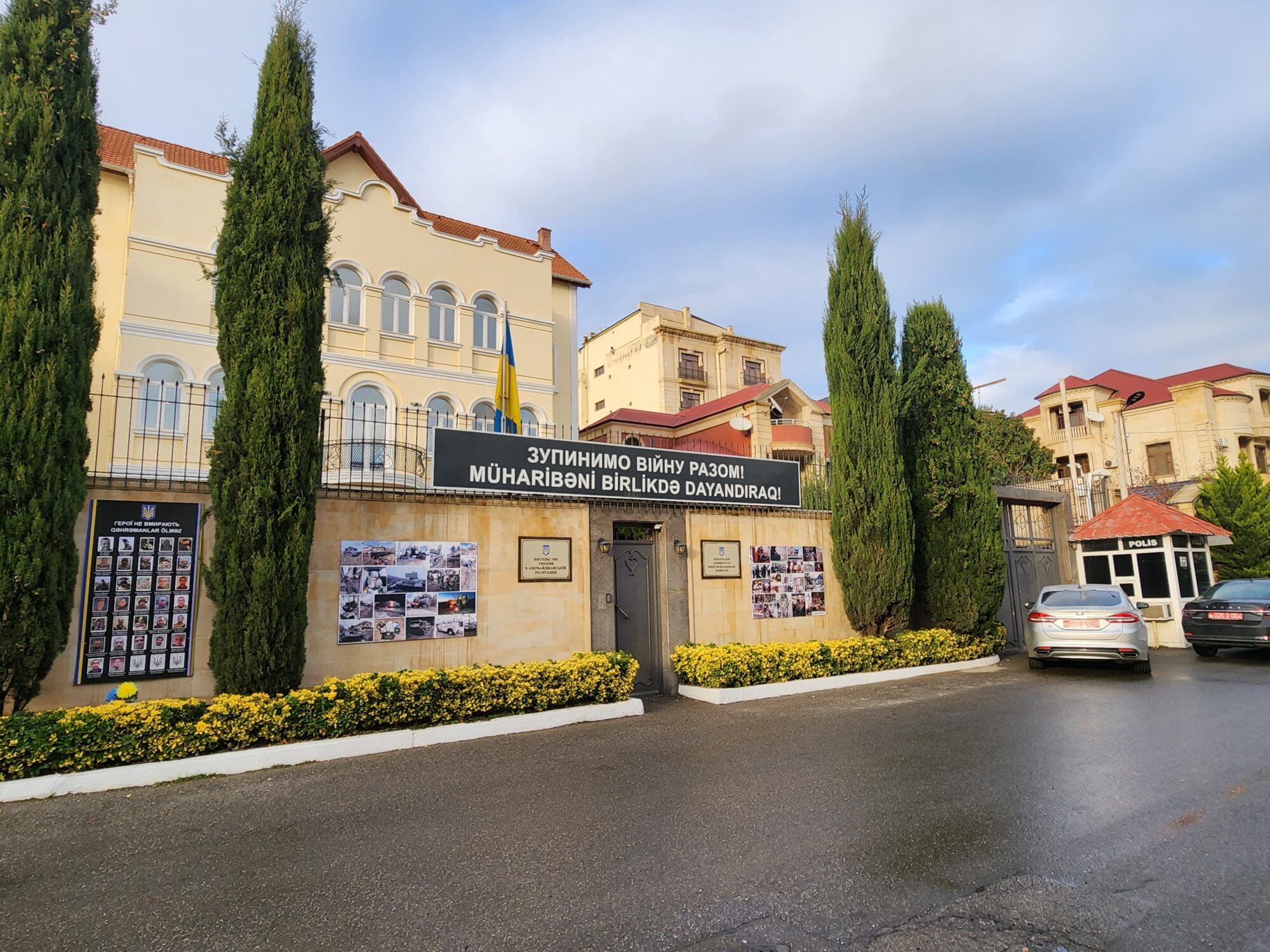
My hotel’s top floor houses its restaurant with a terrace that provides me a 360-degree view of the city. Directly below and around the corner from the hotel is the Ukrainian Embassy, with its 24/7 police protection.
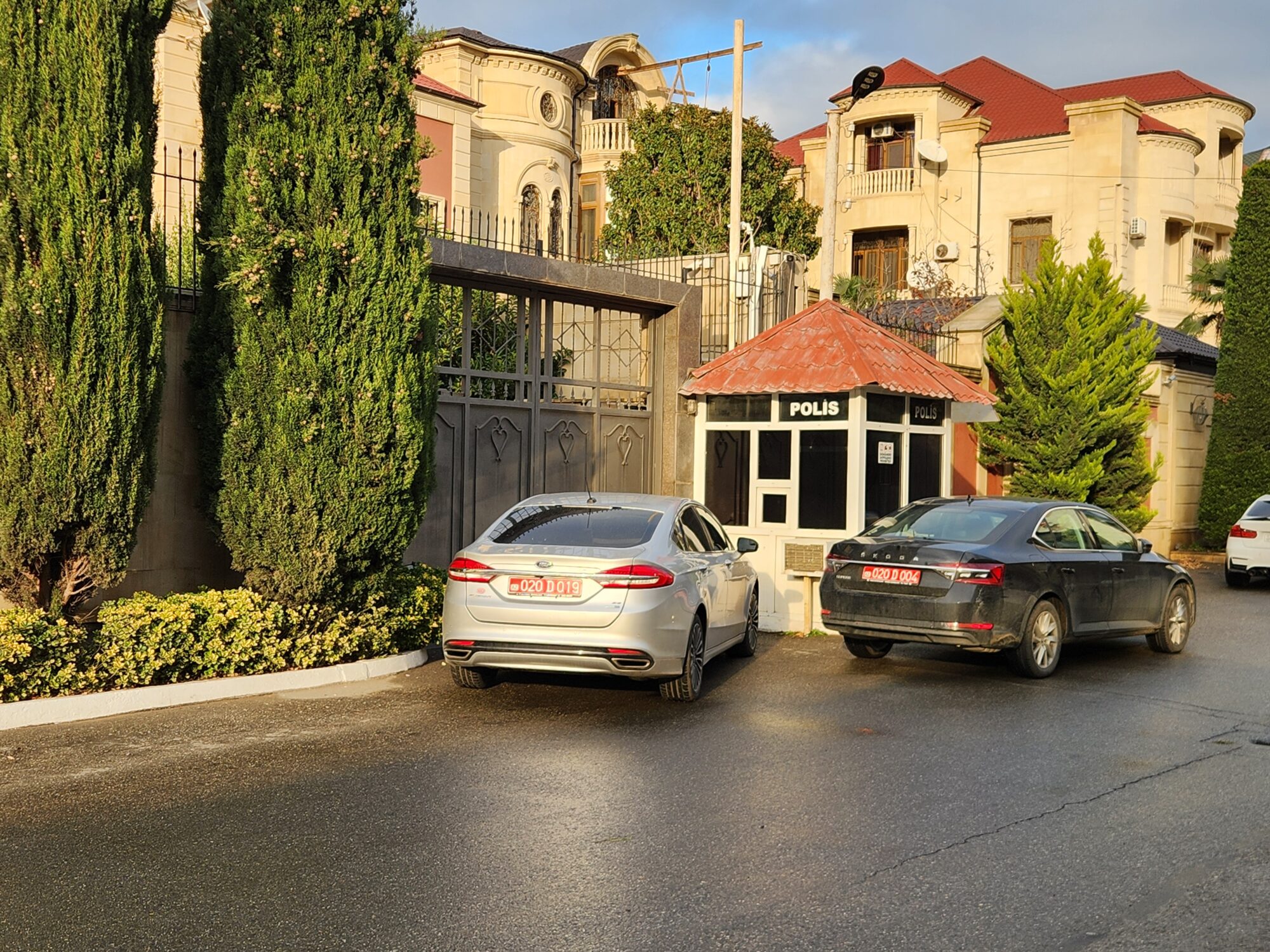
Every Azerbaijan resident I’ve talked to is very welcoming and loves that I am an American. Baku has a number of well-loved street cats, and many of them have human-made cat houses.
Every day I travel to and from the COP29 venue by a combination of walking, shuttle buses, and the excellent metro system. All of these modes are free for COP29 participants. My only struggle in Baku is that only a small percentage of residents speak any English, and I know very little of their quite different language (Azerbaijani, closely related to Turkish). I have an electronic translator that has been very helpful.
November 16 | U.S. Senators on the Future of Climate Legislation
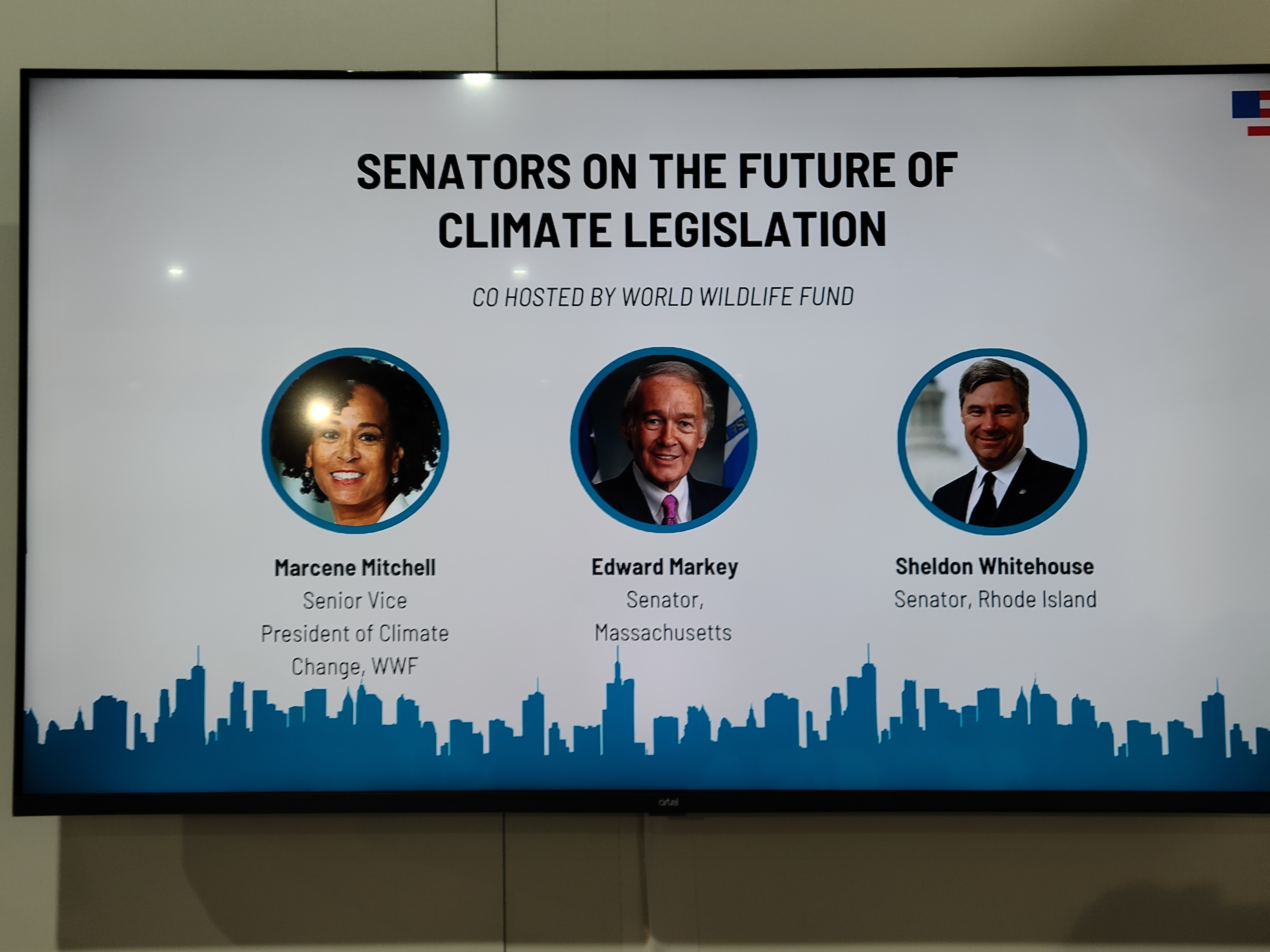
Saturday morning brought a packed audience for Senator Edward Markey (D-MA) and Senator Sheldon Whitehouse (D-RI), who have been tirelessly working at the intersection of climate, economics, and federal policy. They are experts and discussed ideas with the audience for an hour.
I got my first opportunity to meet Sen. Whitehouse — he gave me five minutes of time as we were both in the room early, and he learned enough about Minnesota’s climate and clean energy advancement to add Minnesota to the states highlighted in his remarks this morning!
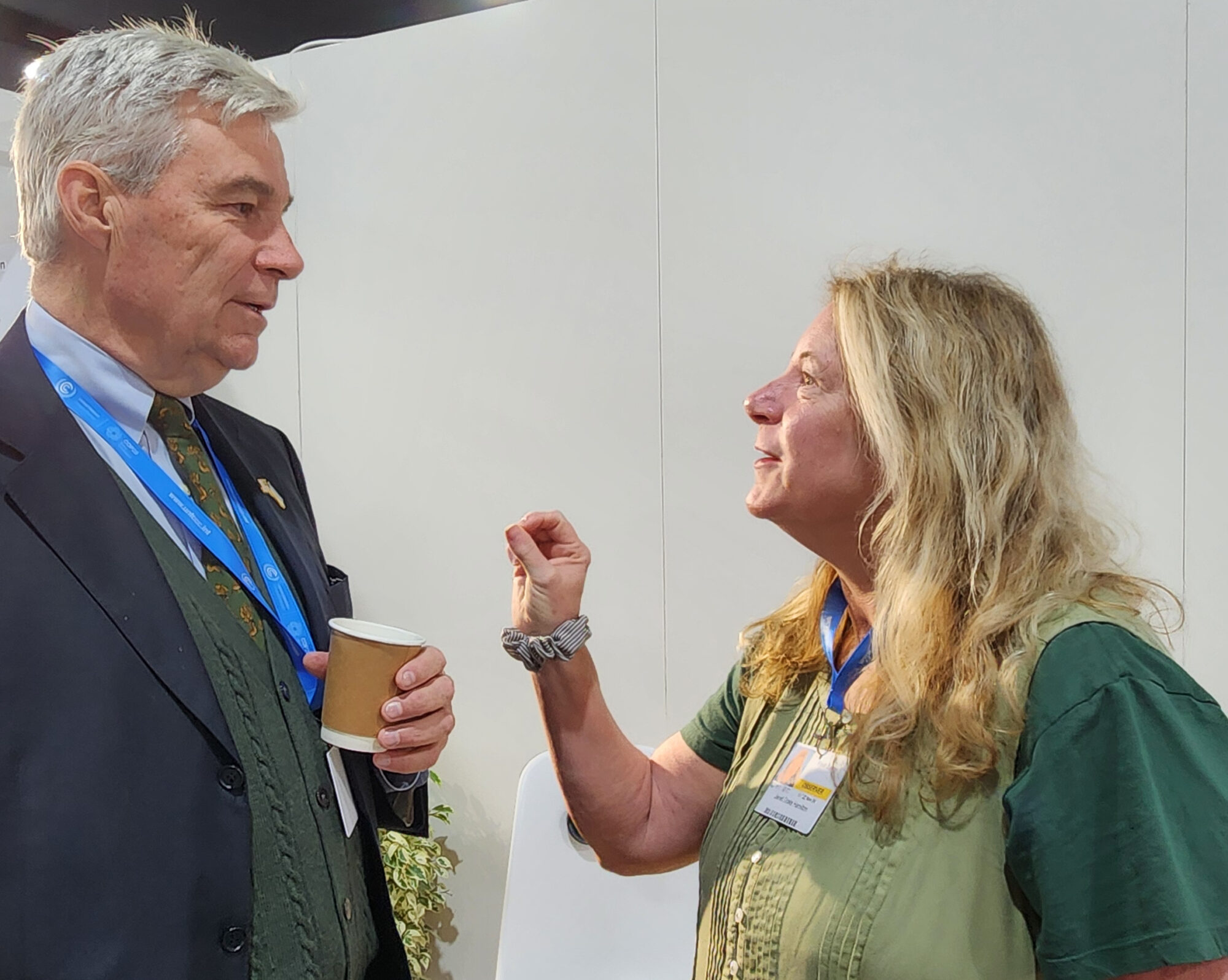
These two great friends have worked together well for years, and for more than a decade they have moved forward bipartisan legislation.
Senator Markey stressed today that, “The science of climate change is at our backs. As are the economics of climate action. We’re right on all of these issues.” The Bipartisan Investment Law and the Inflation Reduction Act (IRA) have created over 400,000 new clean energy and climate jobs, “amounting to hundreds of jobs, thousands of jobs, sometimes tens of thousands of jobs in states across America,” he said.
Both Senators projected that large portions of the IRA will stay in place under the new Trump Administration, because it will be perilous to cause red and blue states to lose new, good-paying jobs.
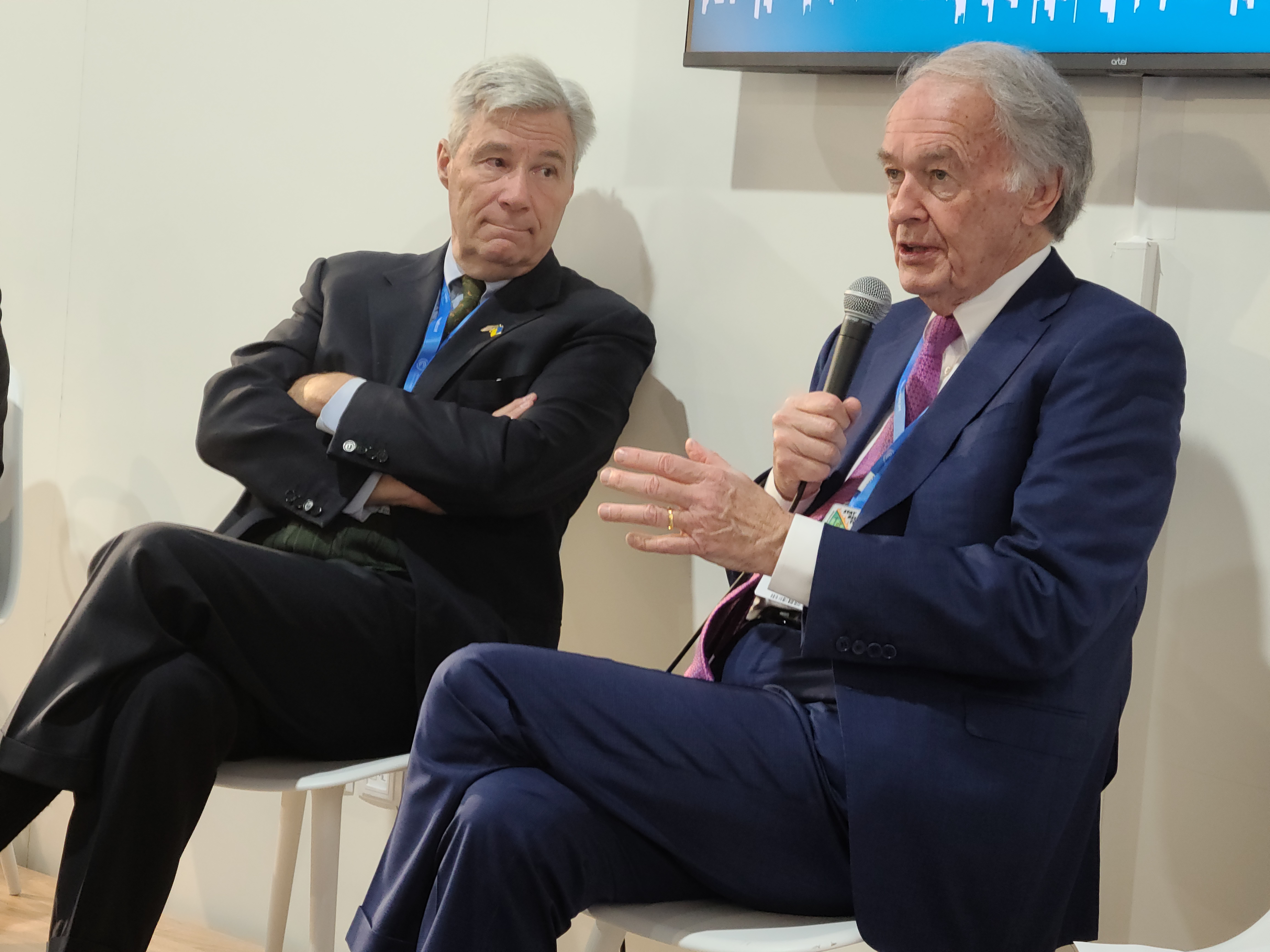
Senators Whitehouse and Markey will be very visible in championing the economics and jobs grown by the unprecedented tax cuts.
Both Senators provided detailed answers to every question the audience posed. I talked with many audience members who were energized by the Senators’ optimism and attention to the hard work needed.
November 15 | Tripling Renewable Energy: Going All In and All Out
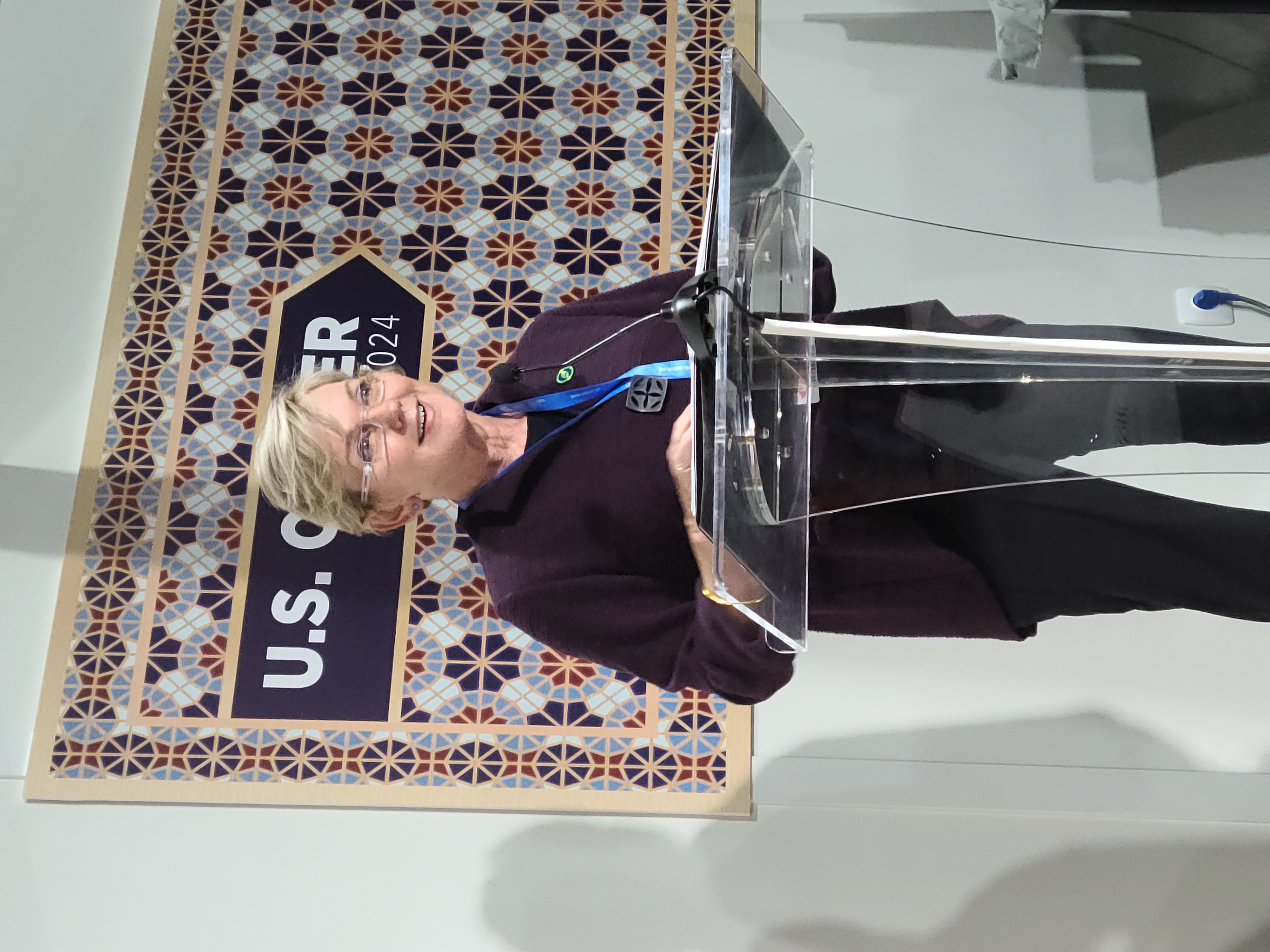
I was seated in the front row to hear from U.S. Department of Energy Secretary Jennifer Granholm; she arrived early and sat beside me. I used well my 5 minutes to speak together. She remembers Fresh Energy and me from a meeting in St. Paul and asked what’s new. I provided details about St. Paul’s The Heights project. The Heights is the East Side site of the first aquifer thermal energy storage system in Minnesota. Developed by Ever-Green Energy, it will provide a mix of market-rate, affordable, and deeply affordable multi-family homes and living wage jobs in the community. All the buildings will be heated and cooled by renewable energy. Secretary Granholm was smiling broadly.
Now her public address:
Secretary Granholm expects that the Paris Agreement will inject $23 trillion into the world economy by 2030. In the U.S. over 400,000 new clean energy jobs have been created so far. Eighty percent of the federal climate and clean energy investment has been in red states and red counties. 86 percent of the investment went to counties with below-national college-educated people.
Granholm gave numerous examples of how our federal policies “Make America irresistible for investments.” She concluded: Our clean energy transition is inexorable.
The U.S. Department of Treasury’s Ethan Zindler contributed that the Bipartisan Infrastructure Law and Inflation Reduction Act (IRA) contain the most important set of climate policies, ever. In just 22 months, $490 billion (almost one-half a trillion U.S. dollars) has been invested in American clean energy. The IRA is an unprecedented amount of tax cuts for people and businesses and communities in the United States.
Zindler reported that in the world in the past 12 months, $1.8 trillion dollars went into clean energy. The IRA is like a goose laying golden eggs across the U.S. Asked by an audience member what people in states should do, Zindler answered: 1) exploit the IRA, and 2) defend the IRA.
Secretary Granholm was joined on the U.S. Center stage by Dr. Fatih Birol, the Executive Director of the International Energy Agency (IEA).
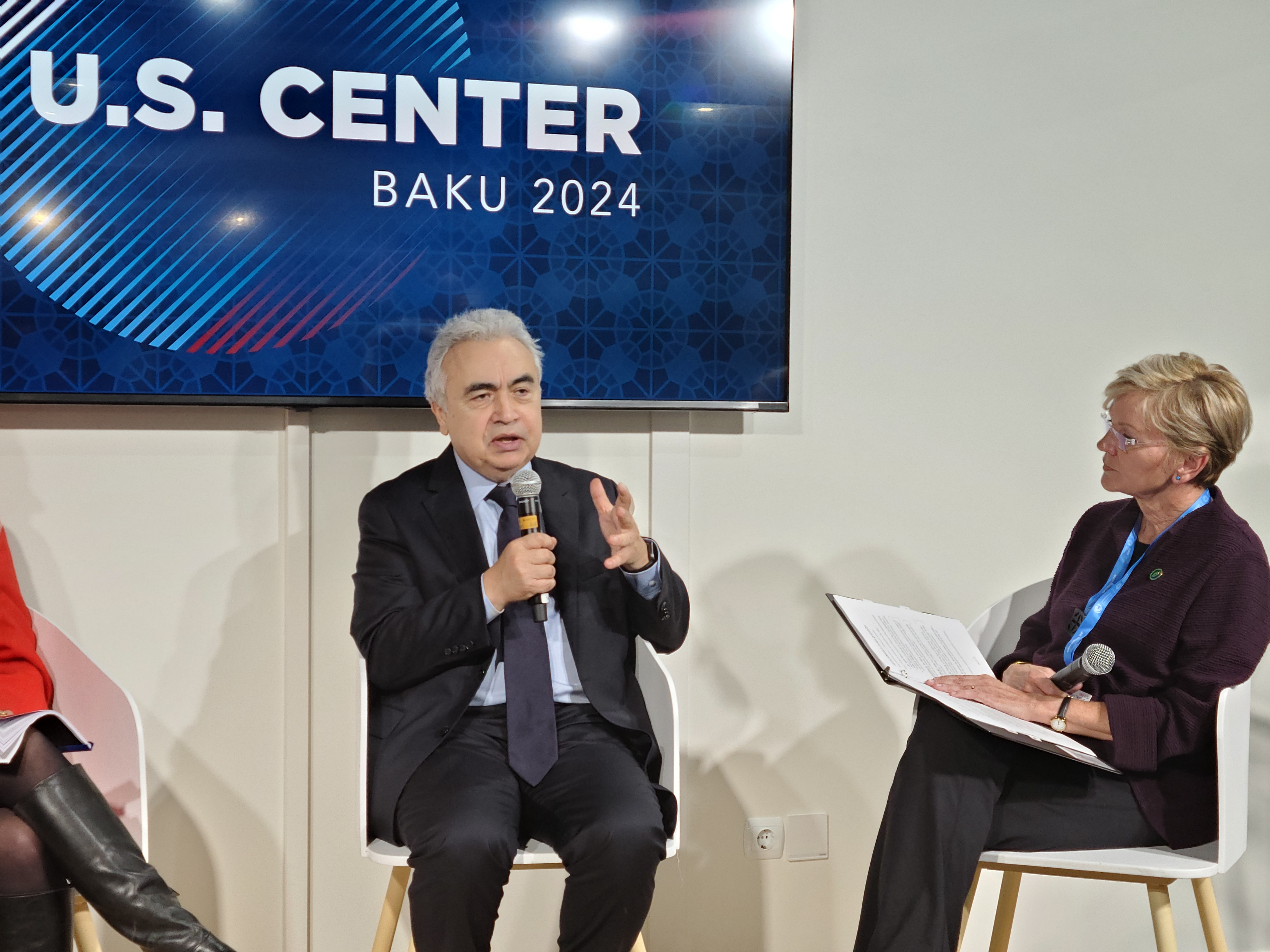
Birol stated that diversification is an important term in energy systems. One critical component of diversification is affordable battery storage. Dr. Birol focused today on long-term storage, reporting excellent news that energy storage costs have come down 20 percent this year. Now, solar with storage is the cheapest source of power in 90 percent of the world.
Separately at COP29, UN Executive Secretary Simon Stiell announced that in 2024 the world has committed $2 trillion toward clean energy. That’s nearly twice the investment that finances fossil fuels.
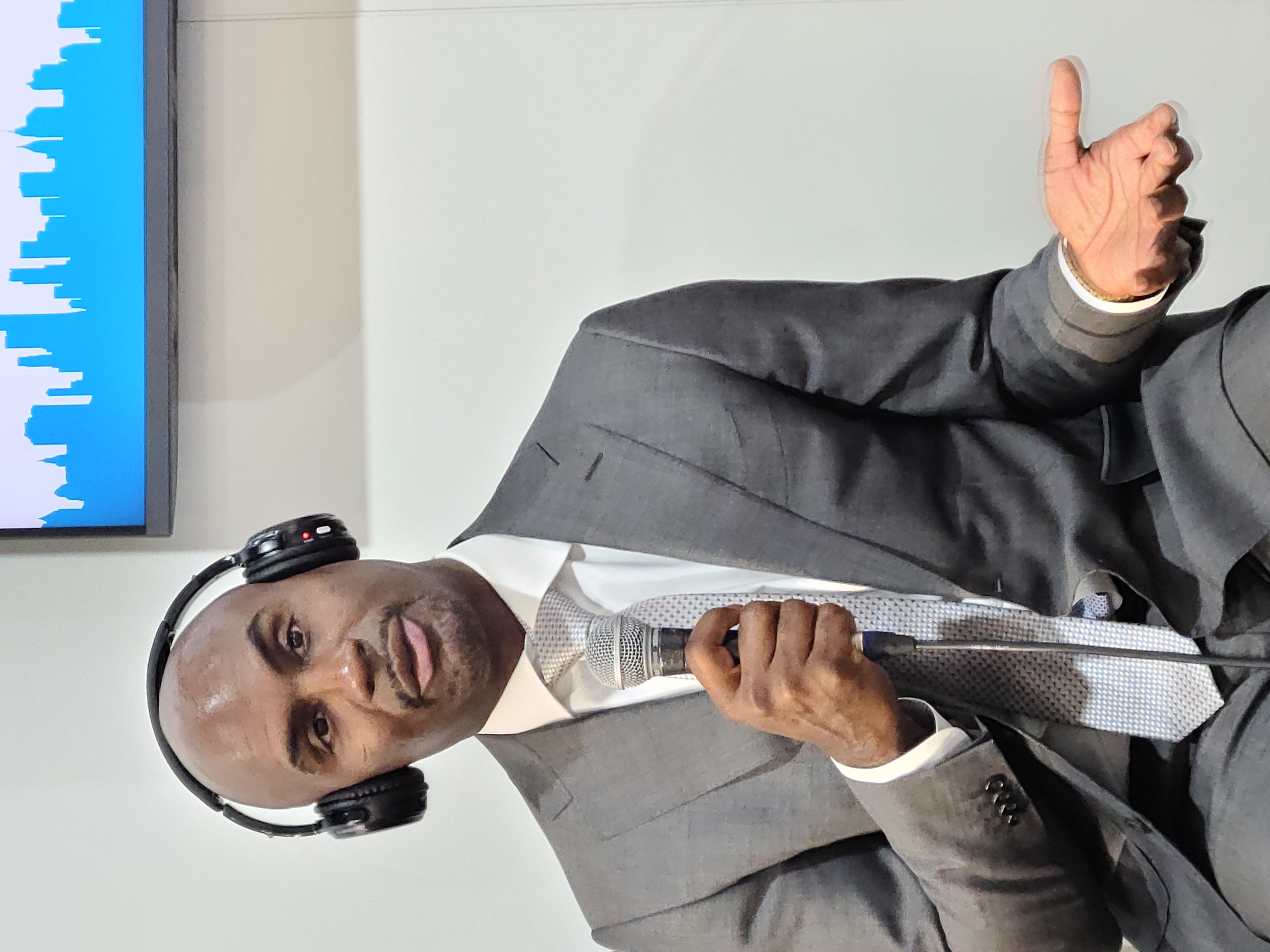
I was delighted to spend time with long-time Fresh Energy friend, Jamez Staples, President of Renewable Energy Partners. He spoke from the America Is All In stage on the panel “Advancing Climate Action and Environmental Justice in Communities Across the United States.”
Staples’ goals include how we can move ahead under the Trump Administration, aka how can Minnesota move ahead without the federal government. He understands that Trump is all about business. Renewable Energy Partners’ business is all about moving equitable renewable energy forward, especially training young people from underserved communities to be ready for new clean energy jobs.
Jamez reports that his team hedges investments in solar, which last for 25-30 years. Leveraging the unprecedented current renewable energy tax cuts will be critical particularly in the next 2 months.
November 14 | Climate Action Plans
Two major G20 economies in the past two days have submitted to the UN their new climate action plans (NDC 3.0) with aggressive, bold targets by 2035. COP29 President Babayev and the UN Climate Change Executive Secretary Simon Stiell for months have urged the leading developed countries to file their 2035 plans at COP29, three months before the much more ambitious climate action plans are due (the first week of February 2025).
On November 12, Prime Minister Keir Starmer delivered the United Kingdom’s climate action plan. UK’s new climate plan added to plans received earlier from the United Arab Emirates and host Azerbaijan.
The UK announced a new target, to cut greenhouse gas emissions 81 percent by 2035 compared to the 1990 levels. Several Parties at COP29 immediately commented that this “is a shining example of climate leadership,” and some said, “the other G20 economies must follow suit.” Many Observers I spoke with noted that Parties “will need to strengthen their climate plans and ramp up green investments to deliver on their targets in full.”
Yesterday afternoon, Brazil formally transmitted its 2035 climate action plan, which includes an encouraging statement: Brazil says the country would “welcome the launching of international work for the definition of schedules for transitioning away from fossil fuels in energy systems, in a just, orderly and equitable manner, with developed countries taking the lead.”
If Brazil uses COP30 to advance the implementation of a fossil fuel phase out, then the 1.5 degree C goal set in the Paris Agreement would have the chance to be achieved.
Brazil’s new plan was welcomed by UN’s Simon Stiell who pronounced: “With this new national plan, Brazil is out in front on delivering climate action, as the country prepares to host COP30 next year.” He continued, “Two major G20 economies in two days are stepping up strongly—the message is clear: climate action is on the rise.”
However, Stiell has recently stressed that Parties to the UNFCCC need an ABC on NDCs. Observers must hold Parties in their new climate action plans to the letter A, which stands for Ambitious economy-wide emissions targets, to the letter B, that the plan be Broken down into every sector and every greenhouse gas, and the plan should elaborate fully on letter C: Credible regulations, laws, and funding.
I am eager to see the rest of the G20 also transmit their 2035 climate action plans at COP29 or as soon as possible. We will be encouraging Parties, Observers, and the world to ensure that the climate action plans unlock accountable, effective climate action and finance.
November 12 | Hearing from U.S. National Climate Advisor
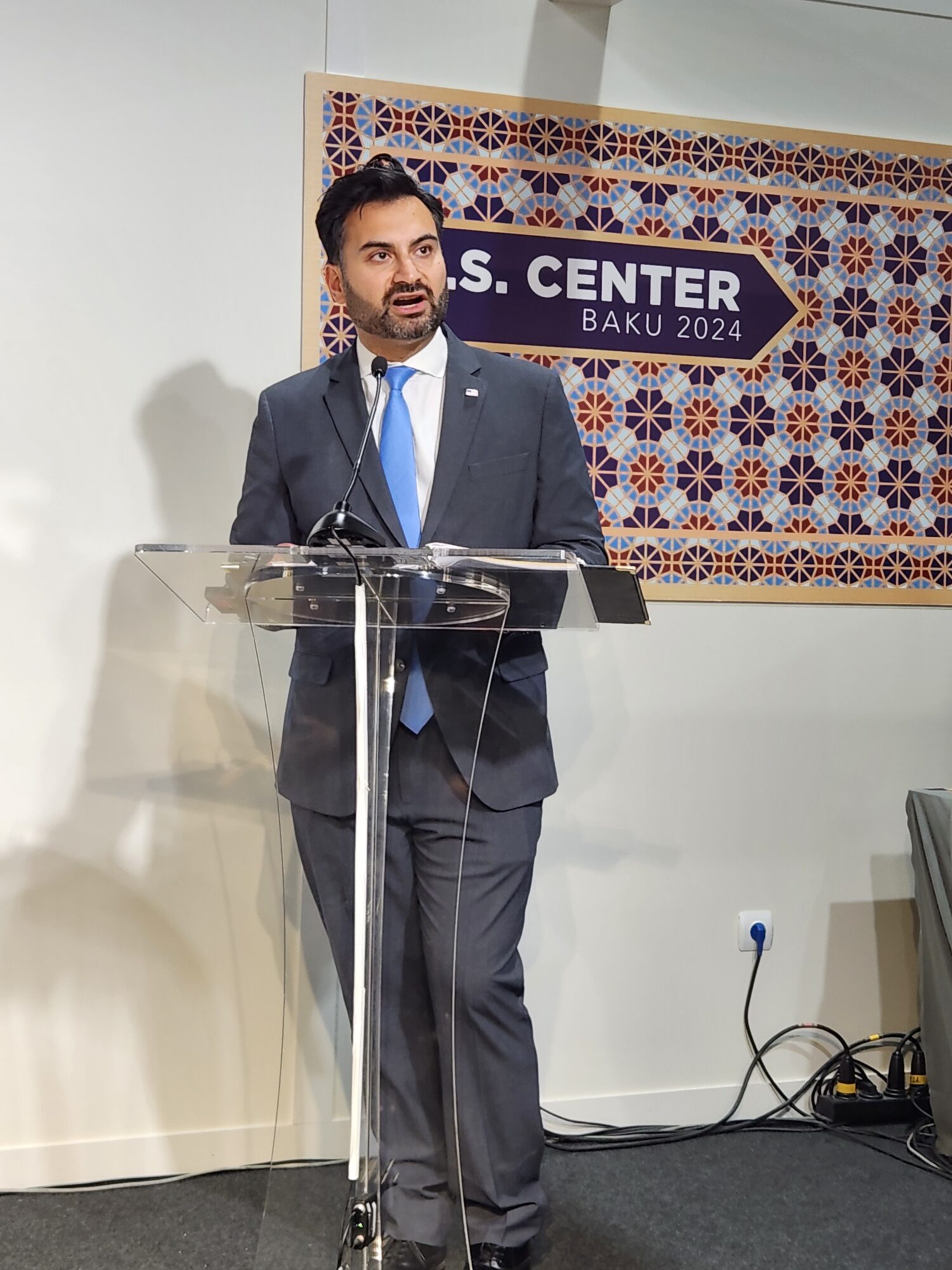
For the third time in recent COPs I’ve attended, I had a chance on Tuesday morning to hear directly from Ali Zaidi, the U.S. National Climate Advisor. Zaidi spoke at length about the geography of climate and clean energy actions across the U.S.
Another of my COP priorities is to seek out other Minnesotans who have traveled to the United Nations summits. I was delighted to see Brooklyn Park, Minnesota Mayor Hollies Winston on a list of speakers at the most influential official pavilion, the federal government’s U.S. Center.
This morning’s agenda included an hour-long panel discussion titled “Raising the bar and setting the pace: cities, states, and regions leading the race forward toward a net-zero, climate resilient future.”
I got to the event early and was seated in row two behind Mayor Winston. I introduced myself and learned a great deal about Mayor Winston’s priorities and his goals for Brooklyn Park’s climate plans.
Mayor Winston represents the Mississippi River Cities and Towns Initiative, which works with communities along the length of the Mississippi River to improve river water quality and habitat restoration. Winston serves alongside several dozen mayors, stakeholders, and decision-makers from over 24 communities along the Mississippi.
Mayor Winston and Fresh Energy will be meeting in Minnesota after COP29 to better understand shared climate priorities.
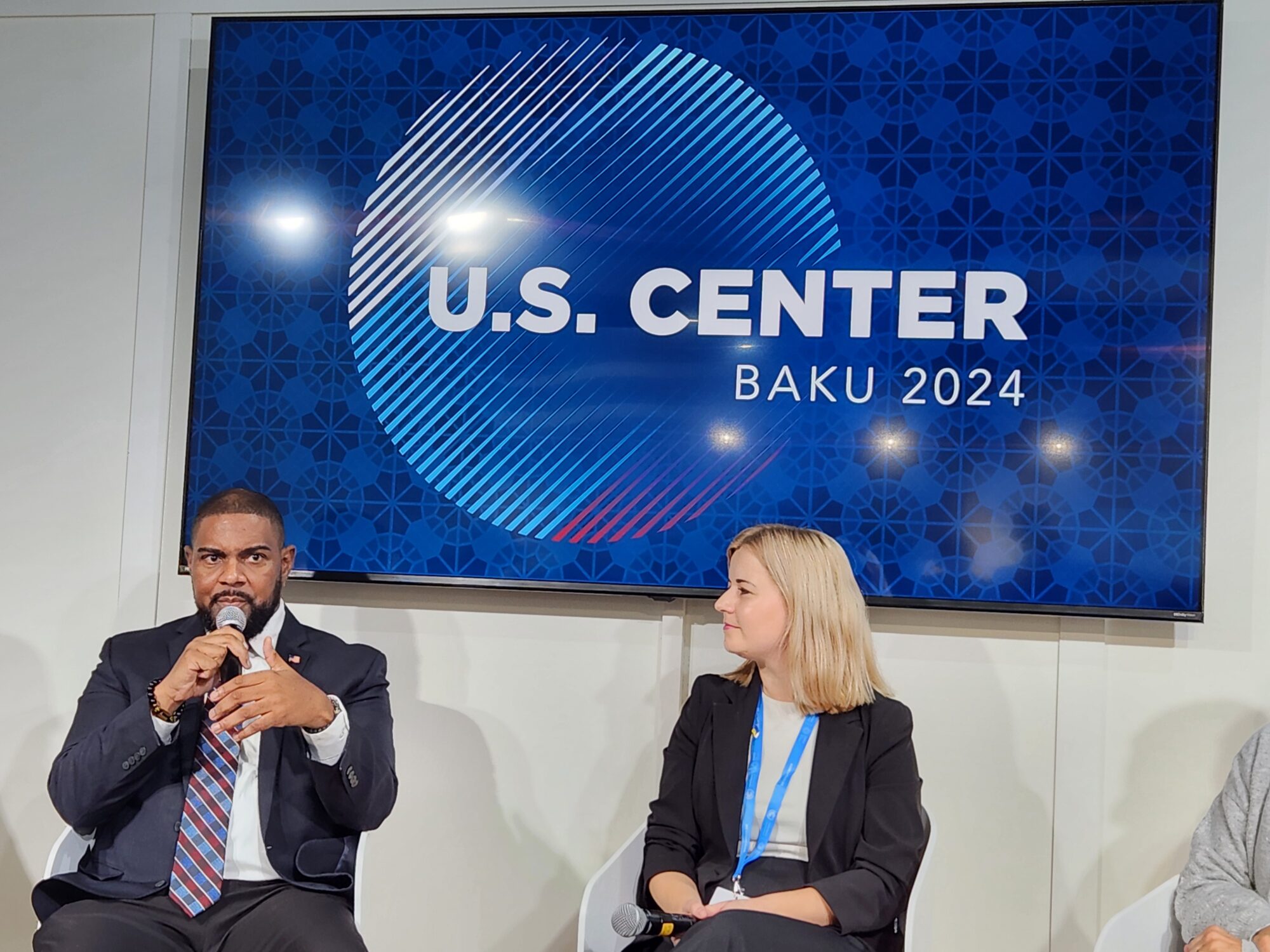
Next up tomorrow: tune back in for my comments on which countries have already submitted their brand new, much more aggressive climate plans, ahead of the early February 2025 United Nations deadline.
November 11 | COP29 Begins
I like to start all COPs I attend — the current one being my ninth COP — by hearing directly from the lead U.S. diplomat. To mark the first day of the COP, the U.S. Department of State hosted a Baku press conference featuring John Podesta, Senior Advisor to the President for International Climate Policy. He is the chief U.S. diplomat and negotiator at COP29 and leads the U.S. federal delegation.
Podesta outlined the U.S. priorities for COP29. He also addressed the results of the U.S. elections. I attended the press conference; Podesta assured attendees “the work to contain climate change is going to continue in the United States with commitment, passion, and belief.”
Podesta continued, “For those of us dedicated to climate action, last week’s outcome is obviously bitterly disappointing, particularly because of the unprecedented ambition President Biden and Vice President Harris brought to the climate fight.” He noted that the Administration and U.S. Congress had “made the largest investment in climate and clean energy in history through the Inflation Reduction Act (IRA) and the Bipartisan Infrastructure Law.”
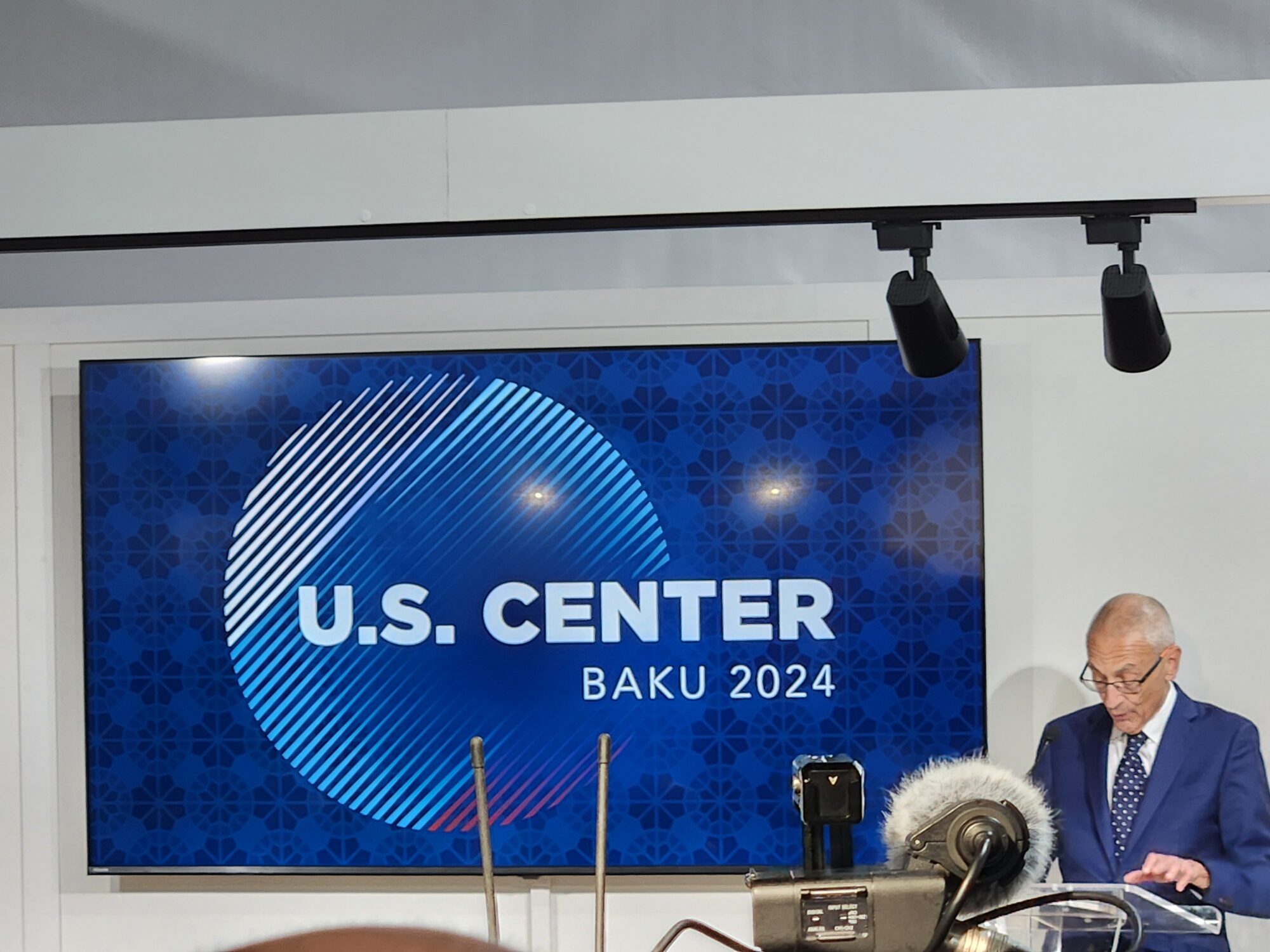
Podesta stated that “57 percent of the new clean energy jobs created since the IRA passed in 2022 are located in Congressional delegations represented by Republicans.” Podesta noted that in August 2024, 18 U.S. House of Representative Republicans sent a letter to Speaker Mike Johnson urging him not to repeal the IRA’s energy tax credits. Some of the signers represent House districts in Arizona, Georgia, Indiana, Iowa, Nebraska, Nevada, Ohio, Oregon, Utah, and Virginia.
During the press conference, Podesta took about a dozen questions from media in the room. The queries and answers covered Podesta’s recent work in China in negotiations with his diplomatic counterparts, his impressions of whether China will take charge of climate action, and international climate financing. Podesta ended by summing up that about 88 percent of IRA funding has now been committed to projects across the United States.
Please join Fresh Energy for our December 3 webinar to hear what COP29 decided by its end scheduled for November 22, 2024.
